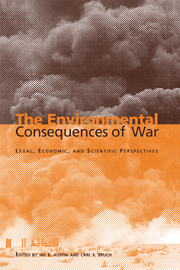Book contents
- Frontmatter
- Contents
- List of illustrations
- List of tables
- List of contributors
- Acknowledgements
- Foreword by Klaus Toepfer
- Introduction
- Part I General principles
- Introduction
- 1 The environment in wartime: an overview
- Part II The legal framework
- Part III Assessing the impacts – scientific methods and issues
- Part IV Valuing the impacts – economic methods and issues
- Part V Prospects for the future
- Index
1 - The environment in wartime: an overview
Published online by Cambridge University Press: 04 August 2010
- Frontmatter
- Contents
- List of illustrations
- List of tables
- List of contributors
- Acknowledgements
- Foreword by Klaus Toepfer
- Introduction
- Part I General principles
- Introduction
- 1 The environment in wartime: an overview
- Part II The legal framework
- Part III Assessing the impacts – scientific methods and issues
- Part IV Valuing the impacts – economic methods and issues
- Part V Prospects for the future
- Index
Summary
Introduction
Concern over the fate of the environment in war has a long history. Deuteronomy forbade the destruction of fruit trees during siege of an enemy's city. In On the Law of War and Peace, Grotius (in a chapter on “Moderation in Devastating a Country, and Similar Matters”) did his best to marshal some other early authority for sheltering the environment from hostile action. He summons Philo, the first-century Jewish philosopher, who chided: “Why vent anger on inanimate things, which are themselves kindly, and bring forth fruit? Do trees, like the men who are your enemies, display signs of hostility, so that for the things they do or threaten to do, they must be uprooted?”
Nonetheless, Grotius was well aware that such expressions of concern were exceptional and probably influenced conduct little. Indeed, at one point Grotius, anticipating von Clausewitz, appears to acknowledge that realpolitik rendered devastation acceptable “if by it the enemy is reduced quickly to suing for peace.” In the last analysis, the demands of military and political necessity were hard to resist, then as now.
In fact, while Grotius did not suppress his sympathy with farmers and beasts and fields, he rested his appeal for moderation less on environmental consciousness than on prudent self-interest: the kings of Macedon, he reminded his readers, “were lenient so the realm might be the richer.” Deuteronomy's injunction against cutting trees extended only to fruit trees, and on the distinctly homocentric ground that “the tree of the field is man's life.”
Two developments have forced us to reconsider our posture towards the environment in wartime. The first is the rise of environmentalism
- Type
- Chapter
- Information
- The Environmental Consequences of WarLegal, Economic, and Scientific Perspectives, pp. 16 - 36Publisher: Cambridge University PressPrint publication year: 2000
- 4
- Cited by



